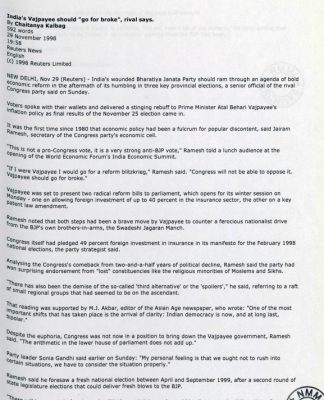India’s Vajpayee should “go for broke”, rival says
[Reuters]
Published date: 29th Nov 1998
29 November 1998
Reuters News
English
(c) 1998 Reuters Limited
NEW DELHI, Nov 29 (Reuters) – India’s wounded Bharatiya Janata Party should ram through an agenda of bold economic reform in the aftermath of its humbling in three key provincial elections, a senior official of the rival Congress party said on Sunday.
Voters spoke with their wallets and delivered a stinging rebuff to Prime Minister Atal Behari Vajpayee’s inflation policy as final results of the November 25 election came in.
it was the first time since 1980 that economic policy had been a fulcrum for popular discontent, said Jairam Ramesh, secretary of the Congress party’s economic cell.
“This is not a pro-Congress vote, it is a very strong anti-BJP vote,” Ramesh told a lunch audience at the opening of the World Economic Forum’s India Economic Summit.
“If I were Vajpayee I would go for a reform blitzkrieg, ” Ramesh said. “Congress will not be able to oppose it. Vajpayee should go for broke.”
Vajpayee was set to present two radical reform bills to parliament, which opens for its winter session on
Monday – one on allowing foreign investment of up to 40 percent in the insurance sector, the other on a key patent law amendment.
Ramesh noted that both steps had been a brave move by Vajpayee to counter a ferocious nationalist drive from the BJP’s own brothers-In-arms, the Swadeshi Jagaran Manch.
Congress itself had pledged 49 percent foreign investment in insurance in its manifesto for the February 1998 national elections, the party strategist said.
Analysing the Congress’s comeback from two-and-a-half years of political decline, Ramesh said the party had won surprising endorsement from “lost” constituencies like the religious minorities of Moslems and Sikhs.
“There has also been the demise of the so-called “third alternative’ or the ‘spoilers’,” he said, referring to a raft of small regional groups that had seemed to be on the ascendant.
That reading was supported by M.J. Akbar, editor of the Asian Age newspaper, who wrote: “One of the most important shifts that has taken place is the arrival of clarity: Indian democracy is now, and at long last, bipolar.”
Despite the euphoria, Congress was not now in a position to bring down the Vajpayee government, Ramesh said, “The arithmetic in the lower house of parliament does not add up.”
Party leader Sonia Gandhi said earlier on Sunday: “My personal feeling is that we ought not to rush into certain situations, we have to consider the situation properly.”
Kamesh said he foresaw a fresh national election between April and September 1999, after a second round of state legislature elections that could deliver fresh blows to the BJP.
“There will be a period of prolonged political uncertainty, prolonged bloodletting in the BJP coalition.”
The biggest bonus for Congress had been the endorsement for Sonia Gandhi, who stepped from reclusive widowhood to control of India’s oldest political machine last April.
Mrs Gandhi’s biggest contribution has been to keep Congress out of power for the past eight months,”
Ramesh said.
But he warned the smell of power could revive old plutocracies and a cry for a return to the socialist populism that had given Congress control of India for most of the past half-century.
“Itchiness and brinksmanship is bound to Increase. You will hear a lot of old rhetoric,” he said, adding that Congress was not likely to be bolder in its economic agenda than the BJP had been.






